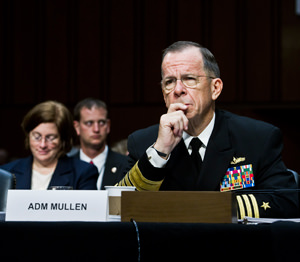Adm. Mullen Says Pakistan Intelligence Supports Bombers
Joint Chiefs Chairman Adm. Mike Mullen was unusually harsh in his criticism of Pakistan on Thursday, saying an insurgent network behind several Afghanistan bombings, including the recent attack on the U.S. Embassy, "acts as a veritable arm of Pakistan’s Inter-Services Intelligence agency." (more)
Joint Chiefs Chairman Adm. Mike Mullen was unusually harsh in his criticism of Pakistan on Thursday, saying an insurgent network behind several Afghanistan bombings, including the recent attack on the U.S. Embassy, “acts as a veritable arm of Pakistan’s Inter-Services Intelligence agency.”
During a hearing of the Senate Armed Services Committee, Mullen did not say that the ISI was planning attacks per se, but that “with ISI support, Haqqani operatives planned and conducted that truck bomb attack, as well as the assault on our embassy.” He added: “We also have credible evidence that they were behind the June 28th attack against the Intercontinental Hotel in Kabul and a host of other smaller but effective operations.”
These quotes are from The New York Times, whose reporters point out that Mullen is soon to retire and his comments may be part of a larger government strategy to lean on Pakistan, a country often described as America’s most important ally in the war on terror.
In truth the relationship has been rocky from the start, certainly long before a team of Navy SEALs found Osama Bin Laden hiding next to a Pakistani military base.
Pakistanis tend not to approve of imperial America, a sentiment often registered with huge majorities in polls, but successive Pakistani governments have depended on U.S. aid for war toys and other perks. The U.S., on the other hand, has been happy to ignore Pakistan’s nuclear dealings in exchange for the privilege to fly drones in and out of Pakistani territory (with deniability, of course). Let’s just say it’s a loveless marriage. But that’s no reason to bomb each other. — PZS
Your support matters…New York Times:
The United States has long said that Pakistan’s intelligence agency supports the Haqqani network, based in Pakistan’s tribal areas, as a way to extend Pakistani influence in Afghanistan. But Admiral Mullen made clear that he believed that the support extended to increasingly high-profile attacks in Afghanistan aimed directly at the United States.
These included a truck bombing at a NATO outpost south of Kabul on Sept. 10, which killed at least five people and wounded 77 coalition soldiers — one of the worst tolls for foreign troops in a single attack in the war — as well as the embassy assault that killed 16 Afghan police officers and civilians.
Independent journalism is under threat and overshadowed by heavily funded mainstream media.
You can help level the playing field. Become a member.
Your tax-deductible contribution keeps us digging beneath the headlines to give you thought-provoking, investigative reporting and analysis that unearths what's really happening- without compromise.
Give today to support our courageous, independent journalists.






You need to be a supporter to comment.
There are currently no responses to this article.
Be the first to respond.